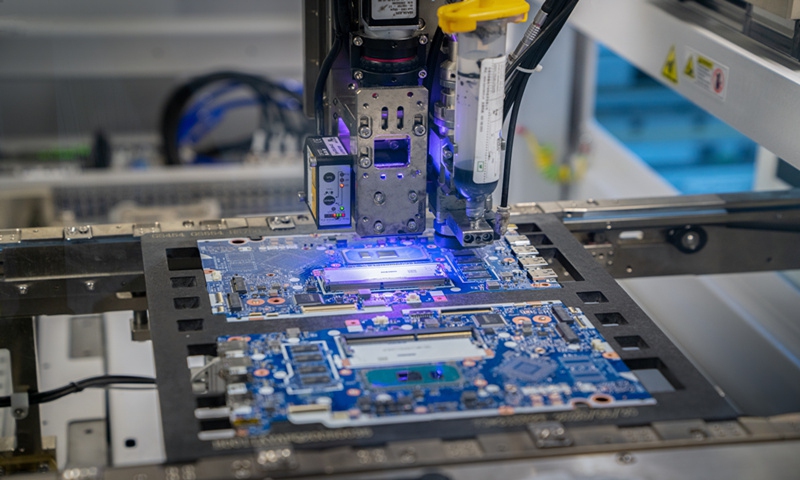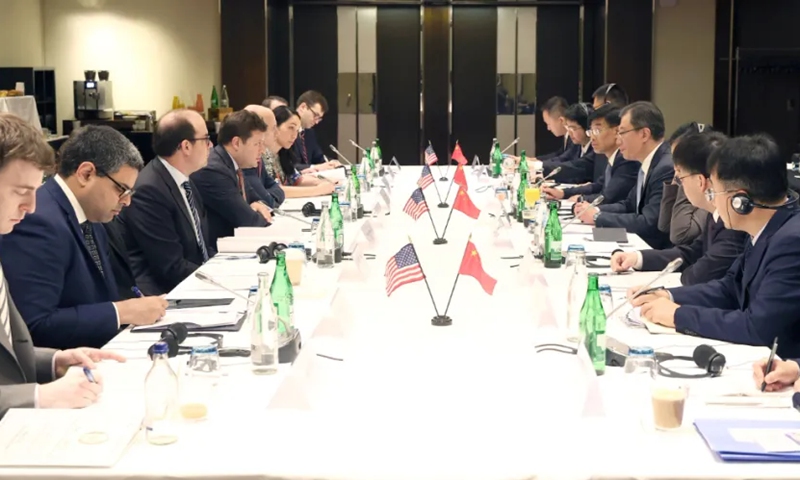China absolutely does not accept egregious suppression, will defend Chinese firms’ rights: FM on US curbs on Huawei AI chips

AI Chip Photo: VCG
A Chinese Foreign Ministry spokesperson on Friday slammed the US over a recent announcement by the US Commerce Department's Bureau of Industry and Security, which claimed the use of Huawei's Ascend chips risks violating US export controls, as well as the bureau's warning to the public about the potential consequences of training Chinese artificial intelligence (AI) models with US AI chips.
Chinese Foreign Ministry spokesperson Lin Jian told a routine press conference on Friday that the US overstretches the concept of national security, abuses export controls and long-arm jurisdiction and groundlessly and maliciously blocks and suppresses China's chips and AI industry.
The US move seriously violates market rules, destabilizes the global industrial and supply chains, and undermines Chinese businesses' legitimate rights and interests, Lin said.
"China firmly opposes this and absolutely does not accept it. China urges the US to drop its protectionist acts and unilateral bullying, and stop its egregious suppression of China's tech businesses and the AI industry," Lin said.
China will take firm measures to ensure its right to development and Chinese businesses' legitimate rights and interests, Lin said.
The remarks by the Foreign Ministry spokesperson followed criticism of the US move by China's Ministry of Commerce.
China's Ministry of Commerce Spokesperson He Yongqian told a press briefing on Thursday that the US announcement is a typical non-market and unilateral bullying practice, which fully exposes the unilateralist and protectionist nature of the US.
The US has abused its export control measures and imposed stricter restrictions on Chinese chip products under unfounded allegations. The move has severely undermined Chinese companies' legitimate rights, threatened the stability of global semiconductor supply chains, violated market rules and disrupted international trade order, He said.
Such move is not conducive to the long-term mutually beneficial and sustainable cooperation and development between enterprises from the two countries, the spokesperson said.
China urges the US to immediately correct its erroneous practice and will take resolute measures to safeguard the legitimate rights and interests of Chinese enterprises, He said.
Ma Jihua, a veteran telecom industry analyst, told the Global Times that despite US efforts to curb China's AI rise - most notably through export controls on high-end NVIDIA chips - China's AI sector remains on a rapid growth trajectory.
The resilience came from the country's solid industrial foundation and a shift toward self-reliance, which has accelerated breakthroughs in both software and hardware, Ma said.
A group of US lawmakers introduced a bill on Thursday that would require makers of artificial intelligence chips such as Nvidia to include technology to verify the location of their chips before exporting them, Reuters reported.
The House bill came after President Donald Trump's administration rescinded a rule enacted by predecessor President Joe Biden that would have regulated the flow of advanced AI chips around the world.
However, these efforts to suppress China's tech advance has been met with criticism from US tech moguls.
Microsoft co-founder Bill Gates said in a recent interview with CNN that the US tech bans on China have forced it to go full speed ahead in terms of chip manufacturing and other fields, suggesting that such bans have the opposite effect of their stated goals.
In the interview, Gates was asked whether the tech bans were "having, in a weird way, the opposite effect." Gates responded, "Absolutely. I mean, they've forced the Chinese in terms of chip manufacturing and everything to go full speed ahead," according to a video of the interview posted by CNN on Monday.
Earlier this month, US chip giant Nvidia's CEO Jensen Huang reiterated the importance of China's AI market following a visit to the country in mid-April, saying that China's AI market will likely reach about $50 billion in the next two to three years, and that missing out on it would be a "tremendous loss," CNBC reported.
Despite US crackdowns, the Chinese AI sector has maintained a rapid growth pace and the rise of low-cost Chinese tech startup DeepSeek has gained global attention.
At present, China is home to over 4,500 AI companies, with its core AI industries valued at nearly 600 billion yuan ($83.25 billion), the Xinhua News Agency reported in May, citing the China Internet Network Information Center in a report on generative AI.
Nvidia is seeking to build a research and development center in China, a plan the company's top boss Jensen Huang discussed with Shanghai's mayor Gong Zheng when they met in April, the Financial Times reported on Friday.




